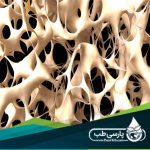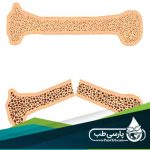Osteoporosis is a disease in which tissue congestion and subsequent bone strength decreases and the risk of bone fracture increases.
This disease is one of the most common causes of bone fracture, especially in elderly.
 Since the age of 30, the process of reducing bone density begins, and on average, women are more likely than men to have osteoporosis.
Since the age of 30, the process of reducing bone density begins, and on average, women are more likely than men to have osteoporosis.
Causes of osteoporosis
- Low calcium diet;
- Vitamin D deficiency;
- Loss of bone density after menopause due to low levels of estrogen;
- Certain diseases and the use of certain drugs;
- Alcohol and tobacco;
- Hyperthyroidism;
- Ovarian surgery;
- Kidney disease;
- Lack of physical activity;
- & Genetic factors;
Long-term use of some medications also has a negative effect on bone density. One of these medications can be anticonvulsants and glucocorticoids such as cortisone.
Prevention of osteoporosis
vitamin D uptake
 Preventing osteoporosis from childhood should begin with an appropriate diet that provides adequate calcium for the formation and strengthening of bone tissues. Also, proper use of sunlight (10 to 15 minutes a day) is also helpful in order to absorb the vitamin D required by the body.
Preventing osteoporosis from childhood should begin with an appropriate diet that provides adequate calcium for the formation and strengthening of bone tissues. Also, proper use of sunlight (10 to 15 minutes a day) is also helpful in order to absorb the vitamin D required by the body.
Of course, the amount of sunlight and vitamin D uptake depends on the skin color, age, season of the year, and place of residence, because excessive exposure to sunlight increases the risk of skin cancer.
Exercise
As we said, physical activity, along with diet, is also beneficial for body firmness and risk reduction of osteoporosis. It is very effective in walking and running around physical activity, because at the time of doing these physical activities, the bones endure the body weight, and this strengthens them.
But in the case of cycling, studies have shown that despite the increased role of cycling in strengthening the heart and lungs, this exercise is not effective in boosting bones as much as walking and running.
Healthy diet
 Excessive drinking of carbonated beverages can also damage the bones in the long run. Some studies have shown that bone loss due to the consumption of such beverages is linked to caffeine.
Excessive drinking of carbonated beverages can also damage the bones in the long run. Some studies have shown that bone loss due to the consumption of such beverages is linked to caffeine.
So, it’s best to keep bones stronger than excessive consumption of other caffeinated drinks, including coffee and tea.
 Parsi Teb Physical and Mental Health Journal
Parsi Teb Physical and Mental Health Journal 


